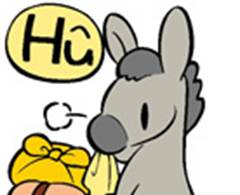题目内容
Brownie and Spotty were neighbor dogs. They loved each other and played together so often that they had worn a path through the grass of the field between their houses.
One evening, Brownie’s family noticed that their dog hadn’t returned home. They went looking for him, but with no success. Brownie didn’t show up the next day, and by the next week he was still missing.
Curiously, Spotty showed up at Brownie’s house alone. He barked loudly. But busy with their own lives, Brownie’s family just ignored (忽略) their neighbor’s nervous little dog.
Finally, one morning Spotty refused to take “no” for an answer. He followed Ted, Brownie’s owner, everywhere he went. He barked, then rushed towards a nearby empty lot and back, as if to say, “ Follow me!”
Finally, Ted followed the dog across the empty lot. The dog led the man to a tree a half-mile from the house. There Ted found Brownie alive. One of his legs was crushed (夹住) in a trap. Ted wished he had taken Spotty’s earlier appeals (求助) seriously.
Then Ted noticed something amazing. In a circle around the injured dog, he saw a lot of dog food. They were the remains of lots of meals.
Spotty had been visiting Brownie every day. He had stayed with Brownie to protect him, snuggling(依偎) with him at night to keep him warm and nuzzling(用鼻子爱抚) him to keep his spirits up.
小题1:What can we learn from the first three paragraphs?
小题2:According to the story, which of the following is TRUE?
小题3:The underlined phrase “keep his spirits up” in the last paragraph probably means______.
小题4:What does the story aim to tell us?
One evening, Brownie’s family noticed that their dog hadn’t returned home. They went looking for him, but with no success. Brownie didn’t show up the next day, and by the next week he was still missing.
Curiously, Spotty showed up at Brownie’s house alone. He barked loudly. But busy with their own lives, Brownie’s family just ignored (忽略) their neighbor’s nervous little dog.
Finally, one morning Spotty refused to take “no” for an answer. He followed Ted, Brownie’s owner, everywhere he went. He barked, then rushed towards a nearby empty lot and back, as if to say, “ Follow me!”
Finally, Ted followed the dog across the empty lot. The dog led the man to a tree a half-mile from the house. There Ted found Brownie alive. One of his legs was crushed (夹住) in a trap. Ted wished he had taken Spotty’s earlier appeals (求助) seriously.
Then Ted noticed something amazing. In a circle around the injured dog, he saw a lot of dog food. They were the remains of lots of meals.
Spotty had been visiting Brownie every day. He had stayed with Brownie to protect him, snuggling(依偎) with him at night to keep him warm and nuzzling(用鼻子爱抚) him to keep his spirits up.
小题1:What can we learn from the first three paragraphs?
| A.Brownie and Spotty didn’t like their owners. |
| B.Brownie was missing for three days. |
| C.Brownie’s family didn’t love him. |
| D.Spotty probably knew where Brownie was. |
| A.Spotty barked loudly at Ted because he was scared. |
| B.Ted followed Spotty because Spotty asked him to. |
| C.Spotty succeeded in escaping from the trap. |
| D.Brownie had nothing to eat that whole week. |
| A.feed him | B.praise him | C.comfort him | D.protect him |
| A.Dog is man’s best friend. |
| B.Even dogs can have strong friendship. |
| C.Dogs are one of the cleverest animals. |
| D.Dogs have a special way to look for help. |
小题1:D
小题2:B
小题3:C
小题4:B
小题1:根据文章内容They loved each other and played together so often that they had worn a path through the grass of the field between their houses.可知答案为D
小题2:根据文章内容大意可知答案为B
小题3:根据词组keep his spirits up的意思,可知答案为C。
小题4:根据文章内容大意可知答案为B

练习册系列答案
相关题目

